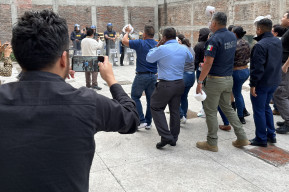News
Next steps for the teaching of entrepreneurial journalism

SembraMedia
For this new study, SembraMedia will interview at least 100 Latin American, Spanish and Hispanic/Latinx professors in the United States, whose answers will eventually be included in the project's interactive map. Prior to this research, and with the support of the Google News Initiative, SembraMedia will offer a series of activities designed to foster knowledge sharing.
The findings of this report will help both journalism professors who already teach journalism, and those who have never taught the subject. The goal - in addition to research on the state of the issue in the region - is to identify these professionals and then provide them with, and create with them, essential resources for training the journalists of the future.
Starting Point II (Punto de partida II) is a research project on Entrepreneurial Journalism education in Latin America, the Hispanic/Latinx community in the United States, and Spain. In addition to a report with the research findings, it will feature an interactive map of professors to help the ecosystem generate networks of allies and identify educational institutions where new programs that include entrepreneurship in media could be implemented.
In the six years that SembraMedia has been studying the digital native media ecosystem, they have confirmed that there is an unprecedented number (38%) of women leading/founding independent digital media in Latin America. This project aims to boost early-stage entrepreneurial journalism training, which would help ensure the continuity and sustainability of the industry by fostering opportunities for women in journalism.
Starting Point II will share knowledge about where and how entrepreneurial journalism is taught in Latin America, the U.S. Hispanic/Latinx community and Spain, and who is teaching it; increase the visibility of professors who are already training their students in this subject; and encourage participation within the Professors Network, ensuring more opportunities for knowledge exchange and partnerships between universities, professors and their students.
Finally, it will serve as a tool for policy makers to advocate for changes in curricula and public policies that can better prepare new generations of journalists in the region. It will also provide organizations that support journalism and media development with valuable information that they can use to decide how to invest funds and develop new entrepreneurship and sustainability programs.
Starting Point
The first Starting Point report was published in 2018 by SembraMedia with the support of the Google News Initiative. That study showed that less than 3% of universities in Latin America and Spain offer entrepreneurial journalism courses in their communications majors.
Based on this discovery, SembraMedia developed a curriculum design as a proposal for universities and created a range of resources to teach journalists skills related to business management.
In addition, this first report served as a catalyst for the creation of the Entrepreneurial Journalism Professors Network (Red de profesores de periodismo emprendedor), a community of more than 300 professionals in the region that generates alliances and conversations in educational settings about the problem of sustainability of independent media.
IPDC
Created in 1980, the International Programme for the Development of Communication (IPDC) is the only multilateral forum within the UN system designed to mobilize the international community around media development issues.
Among other contributions, the programme gives seed funding to grassroots and local actors tackling the media issues of the 21st century on the ground. By providing funding to media development projects that contribute to sustainable development, democracy, and good governance, IPDC supports the implementation of the standards it sets while developing institutional and human capacities.








